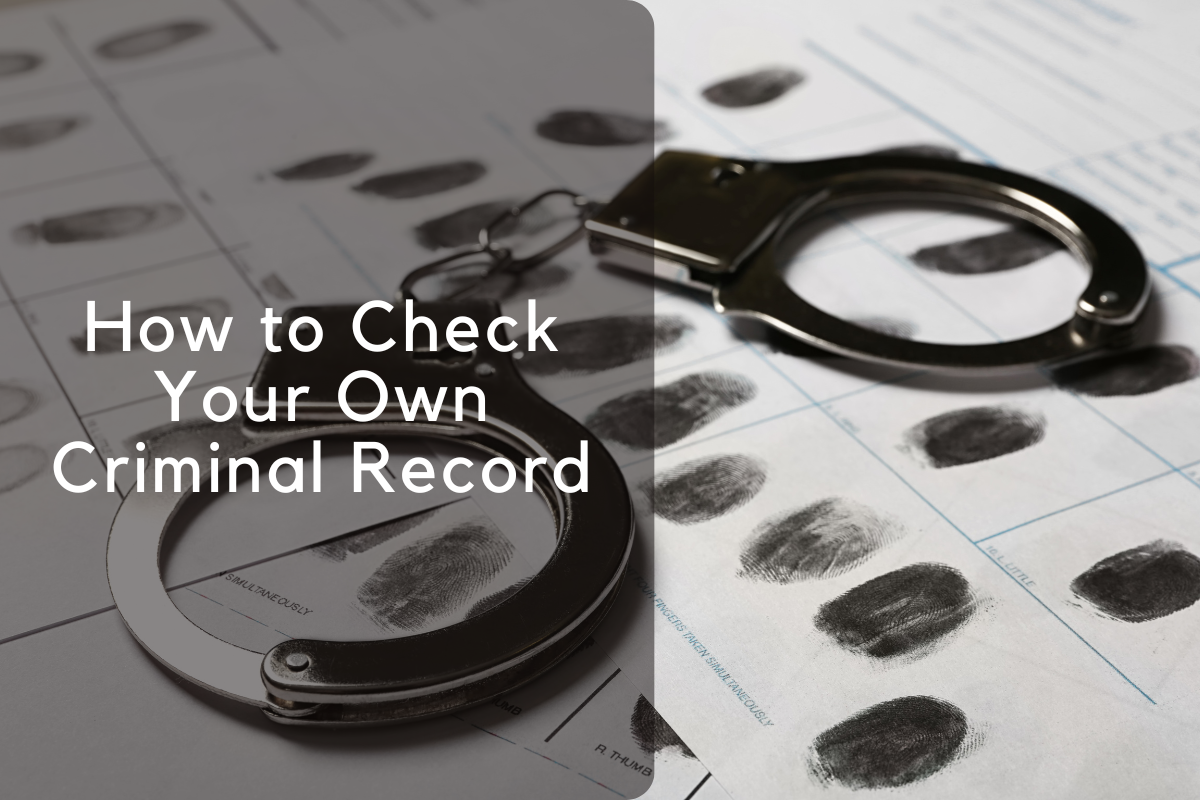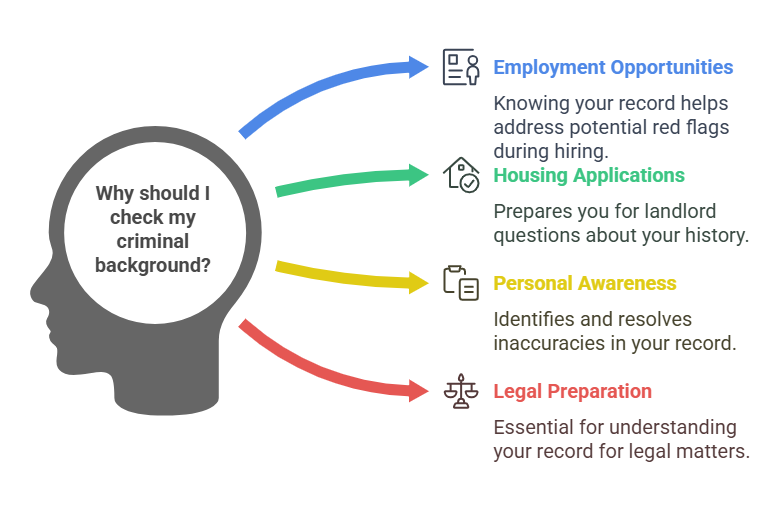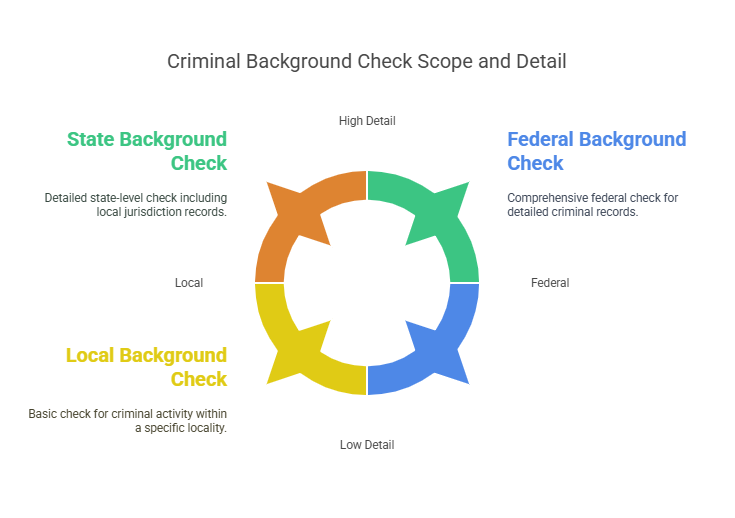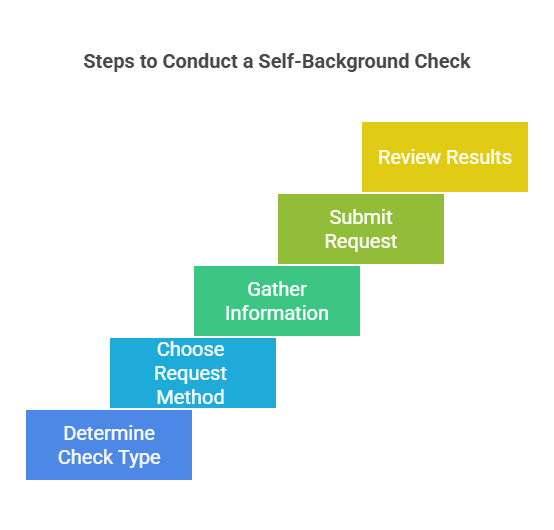Table of Contents
ToggleUnderstanding Criminal Background Checks on Yourself

What is a Criminal Background Check?
A criminal background check is the process of reviewing an individual’s criminal history to determine whether they have been involved in any criminal activity. This check typically includes information about arrests, convictions, and sometimes charges that have been filed against the individual. Criminal background checks are often conducted by employers, landlords, and law enforcement to verify an individual’s history for safety, legal, and compliance purposes.
For personal use, conducting a criminal background check on yourself can provide valuable insight into what others might see if they run a background check on you. Whether you’re preparing for a job application, a rental agreement, or simply want to review your personal history, knowing what shows up on your record can help you address any potential issues proactively.
Why is It Important to Check Your Own Criminal Background?

There are various reasons why individuals choose to perform a criminal background check on themselves:
- Employment Opportunities: Employers may conduct criminal background checks as part of the hiring process. Knowing what’s on your record beforehand can help you address any potential red flags.
- Housing Applications: Landlords frequently run background checks on prospective tenants to ensure they are trustworthy and reliable. Checking your own criminal history can help you prepare for any questions.
- Personal Awareness: Sometimes, criminal records may contain errors or outdated information. Conducting a self-check allows you to identify and resolve inaccuracies, especially if records are incorrectly tied to your name.
- Legal Preparation: If you have been arrested or convicted, it may be important to know what is on your record for potential legal matters.
Types of Criminal Background Checks You Can Perform on Yourself

When performing a criminal background check on yourself, you can access different types of records depending on the level of detail you require. The common types include:
- Local Background Check: This checks criminal records at the city or county level. It can be useful for finding any criminal activity within a specific area.
- State Background Check: This type of check covers criminal records at the state level. It often includes information from local jurisdictions as well.
- Federal Background Check: A federal background check is more comprehensive and involves records from the FBI, including any criminal activity across state lines or violations of federal law.
Each type of check has its own benefits and can be useful in different scenarios. If you’re unsure of the level of detail you need, a state or local background check may be sufficient, but federal checks are ideal for a broader look at criminal history.
How to Access Your Own Criminal Records
There are several ways you can access your criminal background. Below are some of the most common methods:
- Online Services: There are various online databases and websites that allow individuals to run background checks on themselves. Some services offer instant access to criminal records for a fee, while others may provide free limited information.
- Government Agencies: You can request a criminal background check through government agencies, such as the police department or the state’s bureau of criminal investigation. Each state has its own procedures for accessing criminal records, which may involve filling out a request form and paying a small fee.
- Third-Party Providers: Third-party background check companies, like Rapid Hire Solutions, offer services to assist individuals in obtaining their criminal records. These providers often streamline the process, offering faster results and more detailed information than public resources.
In the next section, we will walk you through the process of performing a criminal background check on yourself.
How to Perform a Criminal Background Check on Yourself
Step-by-Step Guide to Performing a Criminal Background Check on Yourself

If you’re ready to perform a criminal background check on yourself, follow these steps:
Step 1: Determine the Type of Check You Need
First, decide what level of detail you need. If you’re just looking to verify if you have any criminal records, a local check may be sufficient. For a more comprehensive review, you may want to request a state or federal background check. If you’re unsure, you can start with a local check and then expand it to state and federal levels if necessary.
Step 2: Choose Your Method of Request
You can perform a criminal background check through different methods, including:
- Online Databases: Websites like Rapid Hire Solutions offer background check services for individuals. They make it easy to check your criminal record from the comfort of your home, and you can typically receive results within a few hours or days.
- In-Person Requests: For state or local checks, you can often visit the police department, county court, or state bureau of investigation in person to request your records. You may need to fill out forms and pay a small fee for this service.
- Requesting Documents from Law Enforcement or Courts: You can directly contact local or state law enforcement agencies to request criminal records. This may require filling out a formal request and providing identification to verify your identity.
Step 3: Gather the Required Information
Before you can perform the check, gather the following information:
- Full name: Ensure you include your full legal name, including any maiden names or aliases.
- Date of birth: Some jurisdictions may also require your birth date to confirm your identity.
- Social security number (if required): Some checks, particularly for federal records, may require this for more accurate results.
- Other identifiers: Certain records may also ask for additional information, such as your address history or previous employers.
Step 4: Submit Your Request
Once you have gathered all necessary information, you can submit your request. For online checks, this will likely involve filling out a form and making a payment. For in-person requests, you’ll need to visit the appropriate agency and submit your paperwork.
Step 5: Review Your Results
After receiving your results, review them carefully. If there is any criminal history on record, ensure that the details match your history. If you find any discrepancies, you may need to contact the agency responsible for the record to have it corrected.
At Rapid Hire Solutions, we can assist in navigating the process of obtaining your criminal records, providing detailed reports that save time and ensure accuracy.
Legal Aspects, FAQs, and Conclusion
Legal Aspects of Performing a Criminal Background Check on Yourself
When performing a criminal background check on yourself, it’s essential to understand your legal rights and the restrictions that might apply:
- Access to Your Records: You have the right to access your own criminal records, but the process for obtaining them may vary depending on your jurisdiction. Many states allow individuals to request their own records, but the exact process can differ.
- Privacy Laws: Criminal records are protected under various privacy laws. As the subject of the record, you generally have the right to request and review it. However, you may not have access to certain confidential or sealed information, such as juvenile records or expunged cases.
- Accuracy and Discrepancies: If you discover inaccuracies on your criminal record, you have the right to request corrections. However, the process for doing so can be time-consuming and requires filing disputes with the relevant agencies.
- Sealing or Expunging Records: In some cases, individuals may be able to have their criminal records sealed or expunged, especially if they were convicted of minor offenses or have completed their sentences. The eligibility for expungement varies by state.
Frequently Asked Questions (FAQs)
How do I check my criminal background?
You can check your criminal background by requesting a copy of your criminal record through government agencies, third-party websites, or local law enforcement.
Can I perform a criminal background check on myself for free?
Some online resources offer limited free background checks, but for a comprehensive review, you may need to pay a fee to access detailed records
How long does it take to get my criminal background check?
The timeframe can vary. Online services may offer instant results, while government agencies can take a few days to a few weeks depending on their processes.
What if I find mistakes in my criminal record?
You have the right to dispute any inaccuracies by contacting the relevant agency or court responsible for the record.
Will a criminal record affect my job prospects?
A criminal record can potentially impact your job prospects, especially in sensitive fields. However, many employers consider the nature of the offense and how much time has passed since the conviction.
Conclusion
Checking your own criminal background is a smart way to ensure that you are aware of what potential employers, landlords, and other entities might find. Understanding the types of checks available, how to access your records, and the legal implications of any findings is essential for making informed decisions. Always be proactive in reviewing and correcting any errors to maintain a clean and accurate record.
